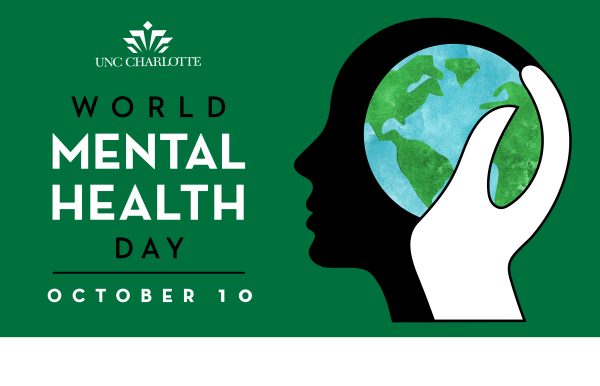World Mental Health Day: Reducing the Stigma

Each year on Oct. 10, the World Health Organization encourages people across the globe to recognize World Mental Health Day. In 2020, its observation lands with added gravity, as the weight of the COVID-19 pandemic and unrest from other sources heighten collective stress. In the midst of these challenges, World Mental Health Day’s goal of raising awareness of the availability and benefits of mental health support offers a path toward relief. One obstacle to broadening their use is lingering stigma around mental health services. UNC Charlotte social work professor and licensed clinical social worker Roger Suclupe offered perspective on reducing public reluctance and the benefits these services can offer.
From your experience and knowledge of research in the field, what benefits can a person gain from seeking mental health services?
I’ve witnessed the benefits of mental wellness support, whether it was a child who experienced trauma or a parent/caregiver struggling with family challenges. They were able to identify and find balance between emotions, thoughts, feelings and actions. From an integrated health approach, when an individual is able to reduce symptoms of anxiety or depression through mental wellness support, it can positively impact their physical health by reducing blood pressure, for example. Looking at mental wellness from an integrated health perspective helps reduce the stigma that surrounds receiving support.
What are some of the reasons for the stigma around mental health treatment?
Misinformation can lead to assumptions and misconceptions about mental wellness, which affects views on treatment and seeking support. There is also the issue of access to information and educating communities about mental wellness support. If communities don’t have the ability to gain access to information, they lack the power to receive adequate social and emotional care and support.
Overall, how do college students think about and care for their mental health?
Over the years, we’ve made some strides towards reducing the stigma surrounding mental wellness, but we still have work ahead of us. College campuses have expanded student services that focus on emotional and mental wellness awareness, education and support through counseling centers and activities centers. Here at UNC Charlotte, the Christine F. Price Center for Counseling and Psychological Services provides an array of services for students such as individual and group counseling, crisis management, and educational and preventive programs. They also collaborate with the Student Health Center, Center for Wellness Promotion and University Recreation to promote a holistic and comprehensive environment for students to succeed academically, socially and emotionally.
How has the added stress of COVID-19 affected people’s receptiveness to mental health services?
For the past six to seven months, COVID-19 has consumed our lives and shifted how we work, learn, play, socialize and seek support. This pandemic has become a “stress sandwich” for many individuals who already were experiencing high levels of stress (housing difficulties, employment challenges, food insecurity, educational concerns, family issues, etc.). The needle has moved toward seeking support, especially now that virtual mental health services have become the norm. Virtual and remote access has provided individuals the ability to seek and receive support.
What are mental health practitioners doing to help reduce stigma?
Getting involved and being active in the community is one way to counter stigma. I currently serve on the Advocacy and Public Policy Committee through Mental Health America of Central Carolinas to help improve the lives of community members. We look at policies that impact programs, advocate for awareness and speak up about mental wellness support. Also, practitioners are leading by example and talking about seeking their own mental and emotional wellness support, which aids in reducing the stigma.
What would you say to someone who is considering seeking mental health support?
Seeking mental wellness support is healthy. It does not mean “something is wrong with you.” For example, if you have an injury like a broken arm, you wouldn’t ignore it, you’d seek help immediately, you’d have it looked at, get an X-ray and cast so it can heal properly. The same goes for our emotional and mental wellness. Addressing our mental wellness needs impacts our physical health needs and vice versa. There is nothing wrong with saying, “I need help.” You are not alone, there are people out there who feel similar to how you’re feeling. It’s okay not to feel okay and it’s okay to say, “I’m not okay”.
UNC Charlotte students considering seeking support can contact the Christine F. Price Center for Counseling and Psychological Services (CAPS). CAPS offers short-term individual and group counseling, crisis management, consultation, referral services, and educational and preventive initiatives for the campus community. CAPS can be reached by phone at 704‑687‑0311 or by email at caps@uncc.edu.
